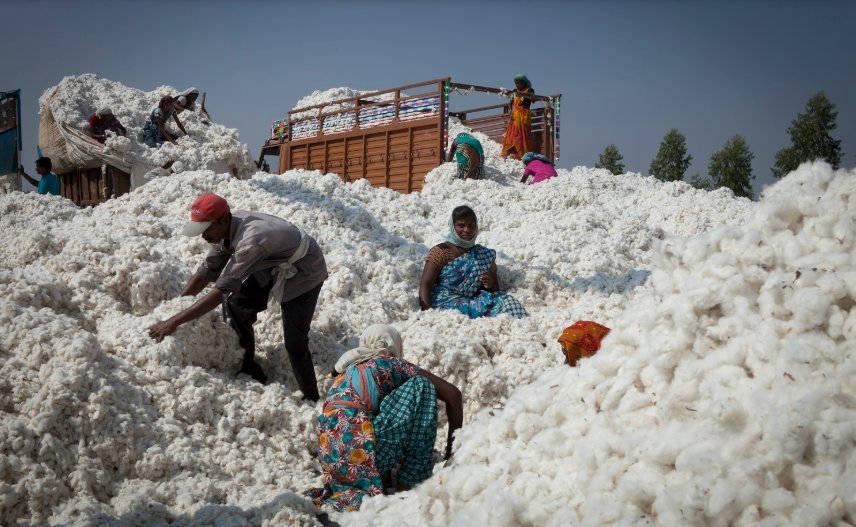Written by Rory Quick
 Image by Better Cotton. Access here: https://bettercotton.org/2020-sustainable-cotton-ranking-launched/
Image by Better Cotton. Access here: https://bettercotton.org/2020-sustainable-cotton-ranking-launched/
From jeans to linens, t-shirts to bedding, cotton is the most widely used natural fibre on the planet. It is truly ubiquitous; cotton represents around half the fibre used to make clothes and textiles worldwide; odds are you are wearing at least one item made of cotton as you read this. Yet cotton’s production is set to face growing difficulties worldwide, due to the ever-malignant effects of climate change. Rising temperatures, drought, and unpredictable weather patterns are forecast to hinder cotton plants’ ability to grow. By 2100, even according to the slowest climate warming models, US cotton yields could decline by 30 to 46%. Cotton requires tropical or sub-tropical climates to grow; by and large, it is grown in developing countries, where production is increasingly affected by soil degradation, water scarcity and climate change. Over 90% of cotton growers live on farms of less than five acres in countries that often lack the infrastructure, policy and funding to respond to the challenges that climate change poses.
Ironically, cotton production - as well as the supply chains it feeds - plays a huge role in causing and exacerbating the problems the industry is forecast to face. Although we might not see this directly when we consume, the production of one kilogram of cotton requires 10,000 litres of water. Additionally, the total emissions for a white cotton shirt from field to customer are 36 kilograms of carbon dioxide. Think of it this way; when you buy cotton clothing you are also taking on responsibility for the use of water as well as the GHG emissions released across the production chain. On top of this, cotton is the dirtiest crop in the world with respect to chemical use and is largely dependent on fossil fuel inputs. Though cultivated on 2.5% of all croplands, cotton accounts for 16% of annual insecticide use. Add to this the fact that forced and child labour is alarmingly common in the cotton industry, and you can begin to appreciate the scale of the problem that today’s cotton production industry faces.
Luckily, there are solutions that, as consumers, we can play a key role in supporting. Firstly, consider organic cotton, i.e. cotton which is not treated with chemicals or genetically modified. Organic cotton has a 91% lower water consumption than cotton grown with heavy use of pesticides. Further, organic cotton releases 46% fewer CO2 emissions and boasts 26% lower soil erosion. Also, look out for the Better Cotton Initiative logo. The Better Cotton Initiative is a non-profit group that promotes better standards in cotton farming and practice across the globe, accounting for around 25% of global cotton production. Yet whilst less impactful cotton is required, simply switching to less-impactful cotton without addressing our consumption habits will not lead to the scale of change required. This is where Re_considered comes in. Our service enables you to be a part of transforming a system of make-buy-waste into one of reduce-rewear-rework. Imagine the positive changes we can make together if we not only shift to less-impactful methods of cotton production but make use of the cotton we already have, extending the lifespan of our clothes and together reducing our waste as well as our impact on the environment.
